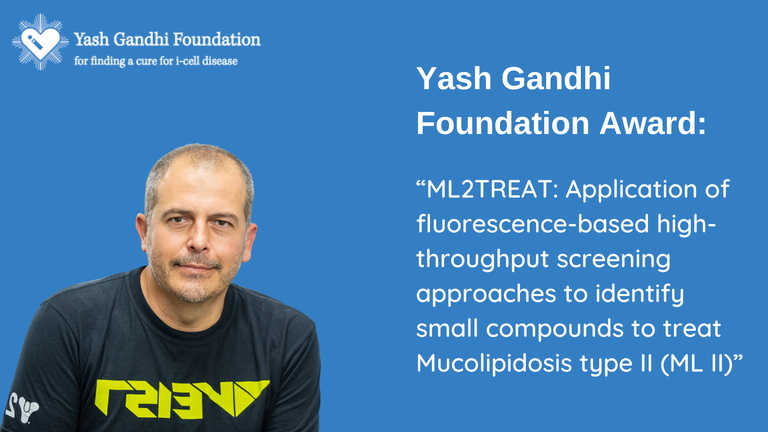Diego Medina Awarded Yash Gandhi Foundation Grant for Rare Disease Research

The Yash Gandhi Foundation awarded two $45,000 research grants to Dr. Diego Medina of the Telethon Institute of Genetics and Medicine (TIGEMin Pozzuoli, Italy, and Dr. Thomas Braulke of the University Medical Center Hamburg-Eppendorf in Hamburg, Germany. Their collaborative project, ML2TREAT, aims to apply fluorescence-based high-throughput screening approaches to identify small compounds for the treatment of Mucolipidosis type II (ML II).
Dr. Diego L. Medina: A Renowned Researcher in Biochemistry and Molecular Biology
Dr. Diego L. Medina earned his PhD in Biochemistry and Molecular Biology from the UAM/CSIC of Madrid, Spain, in 2000. Since 2011, he has been an Assistant Investigator and Head of the High Content Screening Facility at TIGEM. Additionally, since April 2019, he has served as an Associate Professor in Biology at the University of Naples “Federico II,” within the Medical Genetics Unit of the Department of Medical and Translational Science.
Prof. Medina’s research is focused on the fundamental biological role of lysosomal function in health and disease. Utilizing state-of-the-art high content imaging (HCI), cell biology, and OMICs approaches, his team leverages basic research findings to develop new therapeutic strategies for rare genetic diseases. With 57 peer-reviewed articles to his name, Medina’s work is well-supported by various funding sources, including the Horizon 2020 proposal and the Italian Telethon Foundation, as well as disease-specific foundations like the ML4 Foundation, CTF&CATS Foundation, Cure San Filippo Foundation, and MDBR grant program.
High Content Screening Facility at TIGEM: A Hub for Drug Discovery in Rare Diseases
The High Content Screening (HCS) Facility at TIGEM is at the forefront of drug discovery, particularly for rare genetic disorders. HCS is a pivotal tool in pre-clinical drug discovery, enabling the acquisition, management, and analysis of multi-parametric information about cell phenotypes. It allows for the simultaneous examination of how gene modifications or drug exposures impact these phenotypes. Consequently, HCS is integral to secondary and tertiary screening processes, supporting hit-to-lead procedures, mode-of-action studies, and primary screening to identify thousands of potential compounds.
In recent years, TIGEM has developed cell-based high content imaging screening approaches to identify compounds that activate the TFEB pathway in cellular models of Lysosomal Storage Disorders (LSDs). This effort has particularly focused on repurposing FDA-approved drugs to treat conditions such as Batten Diseases, Mucopolysaccharidosis, and Mucolipidosis type IV. The repurposing of FDA-approved drugs offers the potential to significantly reduce the time and cost associated with clinical translation.
The ML2TREAT Project: Pioneering Treatments for Mucolipidosis Type II
The ML2TREAT project, spearheaded by Drs. Medina and Braulke, leverages cutting-edge technologies and the ML II cell model to identify small compounds that could potentially treat Mucolipidosis type II. This lysosomal storage disorder is characterized by impaired pathways that target enzymes to the lysosome. By employing fluorescence-based high-throughput screening, the project aims to uncover how various compounds can influence these pathways, paving the way for novel therapeutic approaches.
Dr. Medina and Dr. Braulke’s extensive background in lysosomal storage disorders positions them uniquely to make significant advancements in this field. Their work, supported by the Yash Gandhi Foundation, represents a critical step towards developing effective treatments for rare genetic diseases that have long been overlooked by profit-driven drug development systems.
Conclusion
The awarding of the Yash Gandhi Foundation grant to Dr. Diego Medina highlights not only his remarkable contributions to the field of rare genetic disease research but also underscores the significant efforts of TIGEM's High Content Screening Facility in advancing drug discovery. By fostering non-profit-driven research and leveraging cutting-edge technologies, TIGEM and researchers like Dr. Medina are making substantial strides in the fight against rare genetic disorders.
